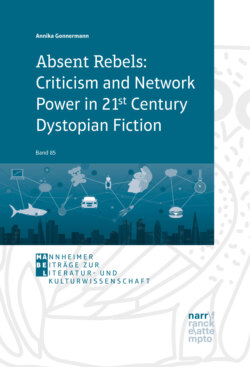Читать книгу Absent Rebels: Criticism and Network Power in 21st Century Dystopian Fiction - Annika Gonnermann - Страница 15
На сайте Литреса книга снята с продажи.
Neoliberalism and the Colonisation of the Imagination: Mark Fisher’s ‘Capitalist Realism’
ОглавлениеFrancis Fukuyama’s notorious ‘End of History’ thesis has popularised the assumption that democracy and neoliberalism are the telos of human destiny.1 In his dialectical, neo-Hegelian approach to history, understood as the process of societies overcoming conflict (cf. Sagar), Fukuyama states that humanity has reached its telos by installing liberal democracies and the free market; it has produced an equilibrium of forces and the “best we were going to get” (ibid.). In Francis Fukuyama’s own words, “liberal democracy remains the only coherent political aspiration that spans different regions and cultures around the globe. In addition, liberal principles and economics – the ‘free market’ – have spread, and have succeeded in producing unprecedented levels of material prosperity” (xiii).2 For better or worse, Fukuyama’s text has often been “read as the apologia for rampant capitalism” (Jacobson), for it advocates the claim that democracy in combination with neoliberalism lacks an equivalent alternative but constitutes the epitome of history.
Neoliberalism has been stylised as the most natural approach to human relations, being accepted even “at the level of the cultural unconscious” (Fisher 6). Mark Fisher has cultivated this assumption under ‘capitalist realism,’ a term created to refer “to the contemporary condition in which all social and political possibility is seemingly bound up in the economic status quo” (Shonkwiler and La Berge 2). He argues that “not only is capitalism the only viable political and economic system, but also that it is now impossible even to imagine a coherent alternative to it” (Fisher 2, emphasis in the original). Taking the view that neoliberalism is the embodiment of the capitalist realist spirit par excellence, Fisher offers a rather bleak diagnosis: the economic sphere has successfully colonised the cognitive capacities of humanity, obscuring the very possibility of conceiving of alternative systems. Capitalism “is more like realism in itself” (ibid. 4), impeding our capacity to conceive alternatives. As Ellen M. Wood comments somewhat sarcastically, “if capitalism is the natural culmination of history, then surmounting it is unimaginable” (Origin 8). Benjamin Kunkel, too, criticises this understanding, “neoliberal principles were ardently proclaimed by some people I knew and shruggingly accepted by most of the rest” (Utopia 6). Entire intellectual schools refuse to even consider alternatives to the status quo, dismissing them as “madness” (Žižek in an interview with O. Jones et al.) and condemning those who articulate them “as lunatic or terrorist” (Levitas and Sargisson 26). Thus, these schools successfully impede the search for alternative social systems, defending free market capitalism as the natural order of things, and decrying alternatives to neoliberalism as “no more practical than time travel” (Beckett). Doing so, they argue that “capitalism is the natural condition of humanity, that it conforms to the laws of nature and basic human inclinations, and that any deviation from those natural laws and inclinations can only come to grief” (Wood, Origin 1).3
It seems, neoliberalism has not only successfully conquered the realm of imagination. It has equally subsumed and become “part of our commonsense understanding of life” (Massey),4 the effect being that it is regarded by some “as a necessary, even wholly ‘natural,’ way for the social order to be regulated” (Harvey, Neoliberalism 41). In the words of Stephen Metcalf, neoliberal capitalism “has come to regulate all we practise and believe” (“Neoliberalism”) and now constitutes common sense. As Stuart Hall and Alan O’Shea have shown, common sense is so hard to refute since it is believed to be egalitarian in nature, accessible by everyone. It is not the privilege of a wealthy and educated elite, but rather “works intuitively, without forethought or reflection” (8) as the direct result of everyday experiences. Neoliberalism functions thus as the common denominator for both ordinary people and the state’s elite:
Through sophisticated public relations, media manipulation and friends-in-high-places the orthodoxy of corporate-led globalization has become the ‘common sense’ approach to running a country. […] The more our lives become entangled in the market the more the ideology of profit before people becomes accepted. (Ellwood 73)
However, the argument based on ‘common sense’ creates a vicious circle, since common sense can “be profoundly misleading, obfuscating or disguising real problems under cultural prejudices” (Harvey, Neoliberalism 39). As Hall and O’Shea reveal, common sense is not external to human experience; on the contrary it is discursively created by those who evoke it in the first place. This self-fulfilling prophecy, according to the authors, produces common sense as an effect (cf. 8f.). Ultimately, it creates the impression that “modern capitalism is the outcome of an almost natural and inevitable process, following certain universal, transhistorical, and immutable laws” (Wood, Origin 16) and is thus legitimately the one social formation that suits human character best.
